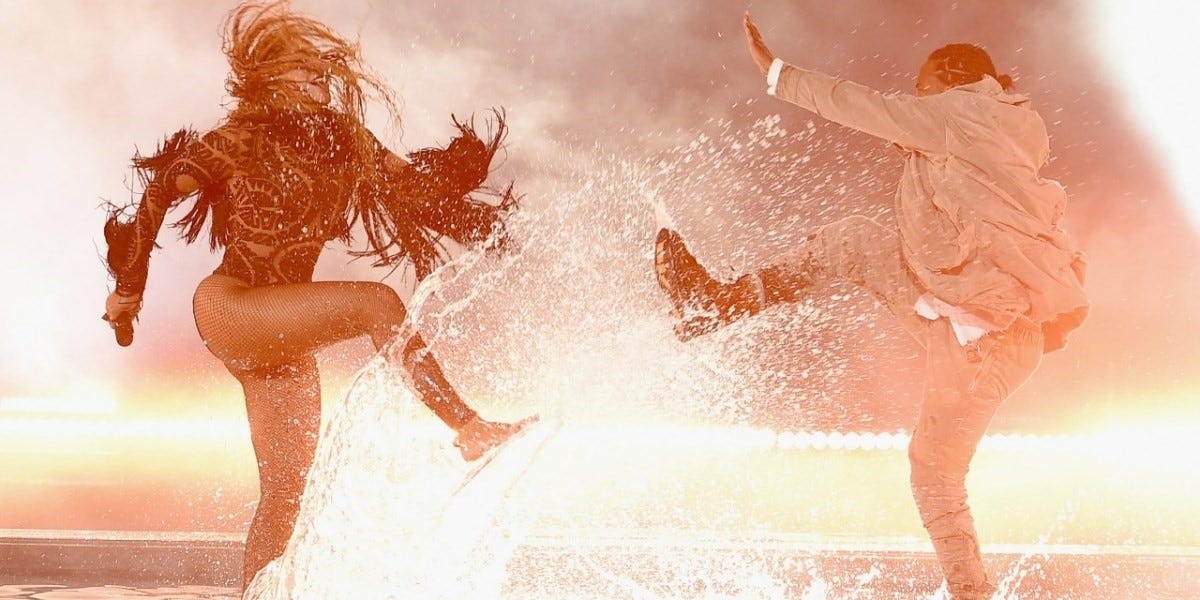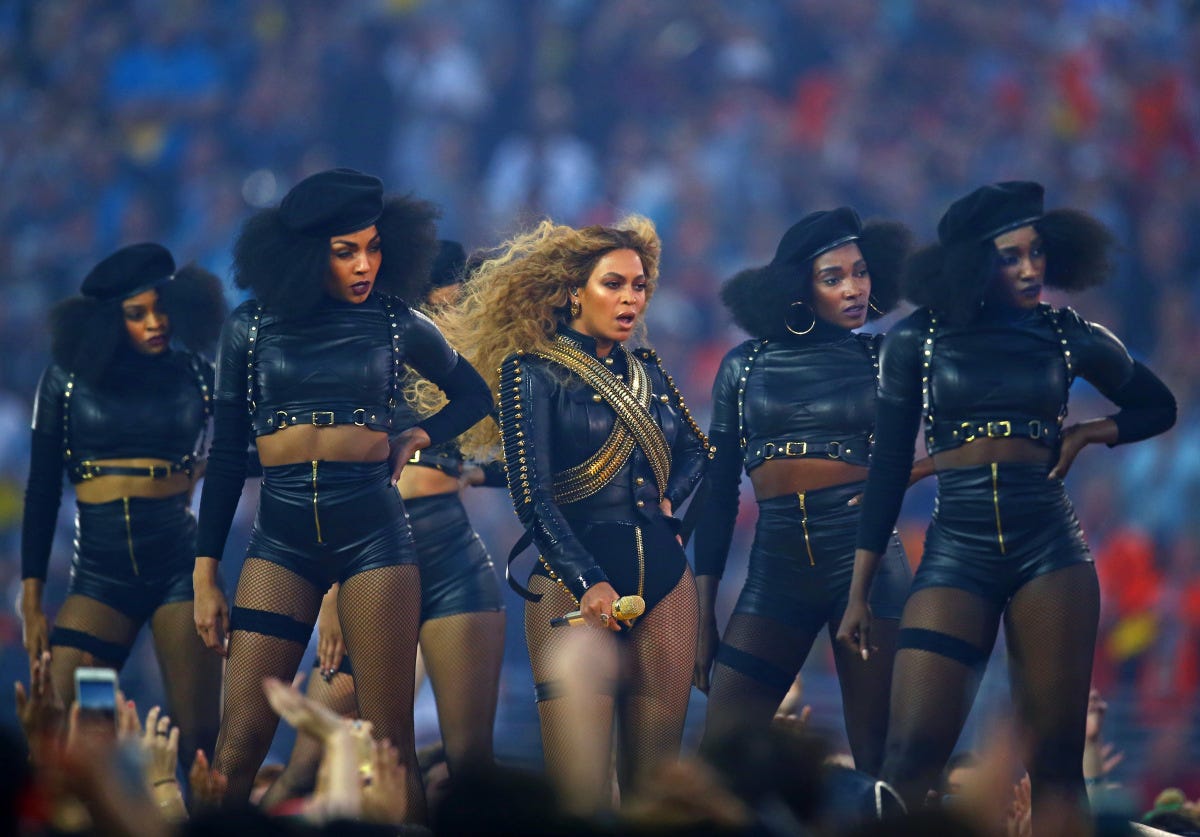Kendrick, the revolutionary, Beyoncé, the culture vulture: A tale of misogynoir
It’s been about a month since Kendrick Lamar performed at the Super Bowl and I think it’s time we have a tough conversation.
It’s been about a month since Kendrick Lamar performed at the Super Bowl and I think it’s time we have a tough conversation. But, we have to set some ground rules first.
First, there will be no reductionist engagements with this piece about how I am a Beyoncé stan or Beyoncé apologist or whatever other terms people have created. I haven’t owned a Beyoncé album since she was Dangerously in Love (2003) or was lamenting the hardships of that love on Lemonade (2016). I have never attended a Beyoncé concert and likely never will. I don’t know the orders of her albums and truly don’t care. I agreed with bell hooks when she suggested that Beyoncé’s image could be understood as a form of terror for young Black girls, especially darker-skinned, fat, disabled, and other non-normative Black girls. However, I believe Beyoncé is the greatest artist of my generation. And, as a fellow Virgo, I deeply respect her drive, her accomplishments, her choices about how she raises her children, and how she deals with haters.
Second, I will not entertain any conversations about my hatred for football. I do hate it. That fact is well-known and well-documented. I abhor our culture of violence and the ways that Black men’s bodies are consumed like meat by mostly white viewers who don’t have any Black friends or community and would probably call the police if they saw one of their favorite players hanging out at a Starbuck’s or bus stop out of their uniform and pads. There is no way that I will feel guilty about this.
Third, I don’t care if anyone thinks this is about me hating men. Kendrick Lamar is not a stand in for men generally or for Black men specifically. He is an incredible rapper from my home state who’s music I love. I believe he has now earned the title of best rapper of all time. But, that fact does not change anything I share here as a part of this analysis.
Okay, so now that we are all on the same page, here goes:
It is quite strange that, on February 9, 2025, Kendrick performed a highly political, deeply symbolic, and extremely Black half-time performance that was accepted across communities and audiences as “revolutionary,” and “radical” when, on February 7, 2016, Beyoncé’s performance of “Formation” at that same event was called “cultural appropriation,” and “performative.”
I just want to gently suggest that maybe because Beyoncé is a woman, one who also happens to be lighter-skinned and blonde, highly-successful, heteronormative, and attractive, her feminisms are often belittled, diminished, and misrecognized. Not only that, even as she continues to evolve as an artist and performer, working to create gender equity on her tours and providing accessible routes to her concerts for fans, these intersectional approaches are never valued as much as Black men making political proclamations.
I just want to gently suggest that maybe because Beyoncé is a woman, one who also happens to be lighter-skinned and blonde, highly-successful, heteronormative, and attractive, her feminisms are often belittled, diminished, and misrecognized.
I argue that neither Kendrick nor Beyoncé are revolutionary/ies. They are brands. And, mistaking them for anything else, is not only myth, it’s a way to hurt our own feelings. But (and), to see Kendrick’s Super Bowl performance as anymore divisive, political, radical, or symbolic than Beyoncé’s (who most certainly laid the groundwork for someone like Kendrick to play that venue) is a form of misogynoir that looks all too familiar.
Revolution. I searched the internet for a concise definition of the term while writing this article. Every online dictionary said something about an “overthrow,” “change in government,” or “rapid transformation” of a society’s state, race, religious, or economic classes. But, one definition that I appreciated most for this context came from the Stanford Encyclopedia of Philosophy. In summary, it said that a political revolution is a “transformative moment marked by profound” change in the political order, “achieved through the use of force.” This is the definition that I was raised with. The one the Black Panthers taught us. When I hear this word, I am looking for change. I’m learning that isn’t the case for everyone.
In the few days after Kendrick’s performance, I heard my students use this word repeatedly about what he had done. People on the internet were using it, too. They talked about the Black men’s bodies that had bent into the shape of the American flag, Samuel L. Jackson’s portrayal of “Uncle Sam,” and the hoopty full of wave cap clad negroes atop the Super Bowl stage. They raved about all of the hidden messages that Lamar tucked into the performance from the references to the prison yard to including Serena Williams just so she could Crip Walk on Drake’s ego.
Perhaps it was Kendrick’s own nod to Gil Scott-Heron’s 1971 poem, “The Revolution Will Not be Televised,” when he said, “The revolution ‘bout to be televised. You picked the right time, but the wrong guy” that placed the words in everyone’s hearts and minds. They mentioned his talking about 40 acres and a mule, an unfulfilled promise to Black Americans for reparations following the end of slavery in the United States. But, when I started asking them about what qualified the performance as a “revolution,” they couldn’t say much else. The language slowly lessened in intensity.
“What was different from every performance by a Black artist before it? What did it change? How does performing in the same space where a known fascist sits enjoying the game disrupt any social order?” I asked.
Then, I got to the heart of it.
“What about Kendrick Lamar’s performance was so different from Beyoncé’s?” I asked them. “She had a fleet of Black women, dressed in all black, in black berets, with their fists raised. That was less revolutionary than this?”
The room erupted.
If Beyoncé is vulturing revolutionary culture, it seems she’s doing it in partnership with Kendrick himself.
“She’s a culture vulture.” “She doesn’t do anything for Black people.” “She was just wearing Blackness like a costume.” “She’s not a Black Panther.” Familiar critiques came up from nearly a decade ago when Beyoncé performed her hit 2016 single “Formation” at Super Bowl 50 alongside Bruno Mars and Coldplay. The song is an overt celebration of Blackness and a outright critique of rampant police violence. She dropped the song the night before the event. Responses were mixed but it’s not surprising who felt offended by her performance.
That same year, Beyoncé performed her duet “Freedom” with Kendrick Lamar at the BET Awards (pictured at the start of the piece). The duo remixed the song under the title “America Has a Problem” during her Renaissance World Tour stop in Inglewood on her 42nd birthday, September 4, 2023. If Beyoncé is vulturing revolutionary culture, it seems she’s doing it in partnership with Kendrick himself.
What is it about Beyoncé that leaves her outside of many people’s imagination with regards to creating industry-breaking music and redefining artistry for a generation? How is it that she has been in the game for more than two decades and still confronts denials of her influence and accolades? Beyond that, as she has produced Blacker, more diasporic, queerer, and more feminist music over the past decade, how has she not been credited with inspiring young artists and activists to think differently about the role of their art and how it shapes the political world? These are just questions I ask looking from the outside in.
Misogynoir is a term for the unique form of racism faced by Black women based on both their gender and race. It’s a term coined by Moya Bailey. It shows up in many pernicious ways but particularly in the misrecognition, erasure, and hypervisibility/invisibility of Black women’s accomplishments and contributions to society. I talk about this in my book Black Women Taught Us in great detail. So, I won’t go into too much here.
I bring the term into the conversation here to offer that, if Beyoncé were a Black man, doing exactly what she has already done, her career, her accolades, her fanbase, everything, would likely look very different. Perhaps, she, too, would be called a “revolutionary.”
To be clear: I’m not here to argue that Beyoncé is a revolutionary artist. I don’t believe that. I’d just like to suggest that maybe none of them really are. Jay Z. Kendrick. Beyoncé. Doechii (I know y’all love her). None of them. Maybe they are just artists. Maybe they’re just going to work everyday like the rest of us. Important. Critical. Intentional. Yes. All those words apply to the types of music these artists create. That doesn’t make it revolutionary.
What if, and hear me out, the revolution actually won’t be televised? What if we won’t see it on the same field where they recently removed the words “END RACISM” from the end zone to appease a known fascist and his wealthy donors? What if we won’t see the revolution in the same arena where Colin Kaepernick remains unwelcome? What if looking to uber rich capitalists like Kendrick and Beyoncé, people who benefit from the system as is, won’t lead us to a revolution at all?
These are just questions. They are questions I hope we start to think about and take more seriously. And, while we’re at it, I hope we also ask ourselves why we are so willing to follow Kendrick into that pseudo-revolution instead of Beyoncé. Because the last thing we need is to put all our revolutionary hopes in a cisgender, heterosexual Black man who has never made any promises to be anything other than the greatest rapper of all-time.






